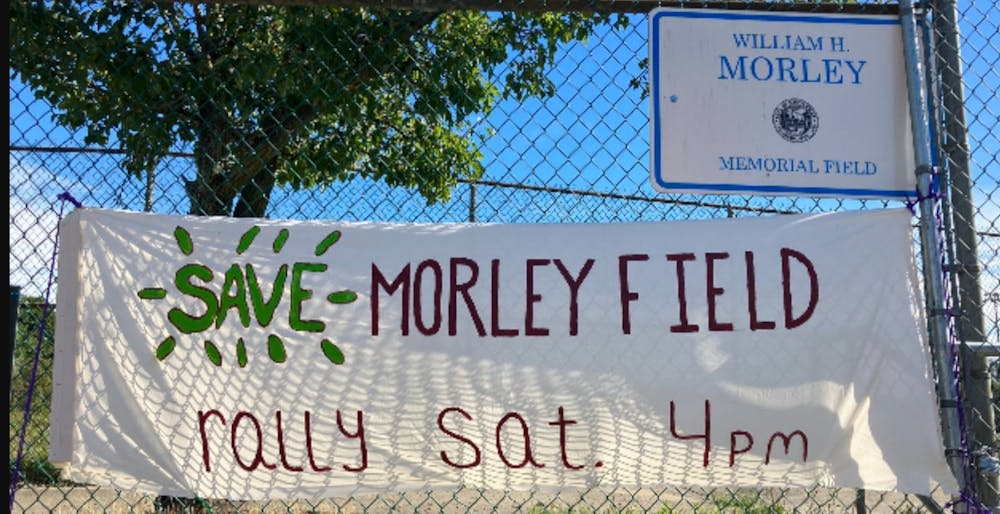The Pawtucket Department of Planning and Redevelopment has proposed a commercial overhaul of Morley Field Park, located in the Woodlawn neighborhood of Pawtucket, according to Pawtucket 5th District Representative Clovis Gregor. City officials, who first introduced the idea in May 2021, are looking to sell the 5-acre site to private developer JK Equities LLC, which would turn it into a parking lot and distribution center, Gregor said.
In recent weeks, the city’s plans have sparked community-wide backlash among residents, council members and political candidates in the area.
“I found (the plan) to be pretty insulting,” Gregor said. “It’s simply not acceptable.”
Morley Field Park, first established in 1970, currently stands as the largest recreational greenspace in Woodlawn, a neighborhood with a working-class population, said Tarshire Battle, founder and executive director of Roots 2Empower. Roots 2Empower is a Rhode Island nonprofit that invests in agriculture and green industries to empower marginalized communities.
She said that Woodlawn is home to many people of color and many households live at or below the poverty rate. She added that Woodlawn has many multi-family units lacking substantial backyards or greenspace. As a Pawtucket resident who is familiar with the affected area, Battle expressed her growing disappointment in city officials, pointing out the severe detriments the new facility would have on already disenfranchised populations.
According to Battle, the parking lot would generate a heat island, spaces in cities that have higher temperatures than surrounding areas. “That alone is environmental racism in my opinion,” she said.
Battle also expressed concerns for the physical and mental well-being of residents if the park turns into a parking facility.
Christopher Hunter, a spokesperson for Pawtucket, wrote in an email to The Herald that he understands why residents are upset. But he wrote that redevelopment is necessary given the neglected and dangerous state of Morley Field.
“Soil samples were taken at Morley Field which found the presence of … lead and gas and oil-related byproducts at levels above residential and industrial direct exposure criteria,” he wrote. “Once we were made aware of these results, we immediately … limited public access to Morley Field.”
Hunter also stated that this “unfortunate reality” has rendered the space unsuitable for recreational usage.
Protestors rallied to preserve and revitalize the green space on Saturday, Sept. 3 outside of Morley Field. One of the event’s organizers, Jennifer Stewart, teaches at the Moses Brown School and is the Democratic nominee for the Rhode Island House of Representatives District 59 seat.
“We had an excellent turnout. … It felt energetic (and) optimistic,” Stewart said. “We possess the power to do something. … It was really gratifying.”
Rhode Islanders from all walks of life came to show their support for the preservation efforts, even if they were not native to the Woodlawn area, Stewart added. “We were all there as concerned people — people who lived in Pawtucket, but also people who lived right over the border. People in Providence could relate to the struggle.”
Throughout the rally, Battle recalled residents sharing personal stories and childhood experiences in Morley Field.
“When you have actual residents at the rally and (are) giving voice to their concerns and talking about their issues, it’s more powerful,” Battle said.
In response to the recent backlash, city officials have said to The Herald and in public meetings that Woodlawn residents will still have access to significant green space, as plans to develop a larger replacement recreation facility are underway.
In a letter addressed to the Pawtucket City Council, Bianca Policastro, director of planning and redevelopment for Pawtucket, wrote that because Morley Field was established under a Federal National Park Service’s grant, the city is mandated by law to create a substitute public recreational space of equal or greater area if they decide to sell the current land. According to Policastro, the city has “proposed purchasing a total of 9.49 acres of undeveloped land along the Seekonk river” adjacent to Max Read Field to serve as the replacement.
But some members of the community believe this solution is not enough.
“It doesn’t do anything for the community as far as green space. (The new location is) in another district, it's about a mile or so away” from Morley Field, Gregor said. “It does nothing to mitigate the loss of green space or heat zoning.”
Hunter wrote that while he looks forward to continuing his work alongside Gregor to settle the ongoing conflict, he maintains his support for moving forward with the city’s plans.
“This is a win-win,” Hunter wrote. “Pawtucket will boost economic development with the creation of 450 new jobs while receiving a new public park and green space.”

Natalie Villacres is a senior staff writer covering the University Hall beat. She is a junior from Queens, New York City, majoring in education and psychology.





